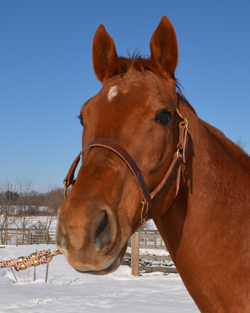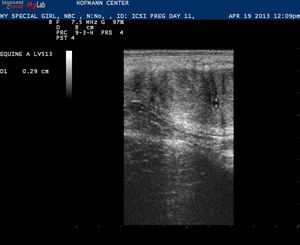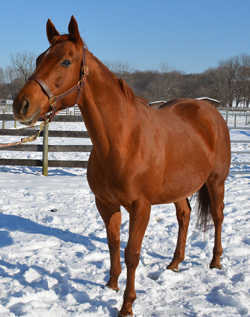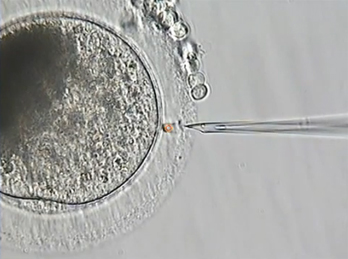New Bolton Center mare pregnant by advanced reproduction procedure
 The ultrasound image shows a perfectly round black circle surrounded by white “snow,” indicating that this mare is pregnant. Confirming success is exciting, even for experienced clinicians, but this was a particularly thrilling moment for the New Bolton Center veterinarians who made it happen.
The ultrasound image shows a perfectly round black circle surrounded by white “snow,” indicating that this mare is pregnant. Confirming success is exciting, even for experienced clinicians, but this was a particularly thrilling moment for the New Bolton Center veterinarians who made it happen.
The pregnancy was made possible by the advanced reproductive technique intracytoplasmic sperm injection, known as ICSI, which involves injecting a single sperm into a mature egg. This ICSI embryo was transferred to New Bolton Center’s surrogate mare, My Special Girl.
“This is when we knew that the embryo transfer had worked,” said Regina Turner, VMD, PhD, Associate Professor of Large Animal Reproduction at New Bolton’s Hofmann Center for Reproduction and Behavior.
My Special Girl’s pregnancy represents the first for Penn Vet using the ICSI procedure, performed as part of ongoing reproductive research at the Hofmann Center. The ultrasound image confirming its success was taken on April 19, when the embryo was about 12 days old.
 “The pregnancy was in its very early stages, but it looked perfectly normal, and it was just the right size, in the right place,” continued Dr. Turner, who is also the Director of the Hofmann Center’s Stallion Frozen Semen Program. “We were very excited. There was yelling. We were calling everyone to come to see.”
“The pregnancy was in its very early stages, but it looked perfectly normal, and it was just the right size, in the right place,” continued Dr. Turner, who is also the Director of the Hofmann Center’s Stallion Frozen Semen Program. “We were very excited. There was yelling. We were calling everyone to come to see.”
And the excitement continues! People across the country and around the world will have the opportunity to monitor My Special Girl before the arrival of this special foal, and witness the live birth via a “Foal Cam.” The live broadcast will be available on the Penn Vet website at www.vet.upenn.edu/FoalCam beginning on February 26. My Special Girl is due to foal in mid-March.
“We hope that sharing the birth of this foal will give the world a window into New Bolton Center, and showcase our caring clinicians and staff, and our expertise in reproduction and neonatal intensive care,” said Corinne Sweeney, DVM, Associate Dean of New Bolton Center.
My Special Girl and Her Foal
Although My Special Girl is not expected to have problems delivering her baby, the mare will deliver the foal in the Graham French Neonatal Intensive Care Unit at New Bolton Center. The unit is designed to accommodate the needs of mares at increased risk for complications and critically ill neonatal patients. Medical staff are on site to monitor the mares 24 hours a day.
 “We don’t anticipate any problems with My Special Girl’s delivery,” Dr. Turner said. “But in the unlikely event that there is a problem, it is critical that we have people on site so that we can intervene very quickly.”
“We don’t anticipate any problems with My Special Girl’s delivery,” Dr. Turner said. “But in the unlikely event that there is a problem, it is critical that we have people on site so that we can intervene very quickly.”
“The foaling will happen very quickly once it starts,” Dr. Turner continued, noting that the active stage of a mare’s labor typically is less than 30 minutes, sometimes less, and usually in the middle of the night.
My Special Girl, an 11-year-old Thoroughbred, was donated to New Bolton Center’s herd of horses used for teaching veterinary students. “Her main role in life is to allow our fourth-year veterinary students to learn how to examine a mare’s reproductive tract and to learn how to manage equine breeding,” Dr. Turner said. “We knew she was a fertile mare and so she was a great choice for this special pregnancy.”
The egg for the foal came from a Thoroughbred-Cleveland Bay cross mare. The sperm was from frozen semen from a long-deceased Thoroughbred-Quarter Horse cross stallion that was part of the Hofmann Center’s teaching program.
Keeping the Baby in the New Bolton Center Family
The foal carried by My Special Girl will be adopted by Rose Nolen-Walston, DVM, New Bolton Center Assistant Professor of Medicine, who lives on a nearby farm. Lisa Fergusson of Cochranville, PA, once on Canada’s Olympic Eventing team, will be the foal’s trainer when it is ready to begin its athletic career.
They hope the foal will compete in eventing, the triathlon of equestrian sport, which combines three demanding disciplines: dressage, show jumping, and a challenging cross-country competition. Eventing requires tremendous athleticism from the horse, and a deep trust between horse and rider.
“The bloodlines make it possible for this foal to be a terrific sport horse,” Dr. Nolen-Walston said. “We would love this foal to compete at the Plantation Field Horse Trials in five or six years.”
The ICSI Procedure
The embryo was created in early April using the ICSI procedure. This complex process involves injection of a single sperm cell into a mature egg, or oocyte, using a specialized, high-powered microscope with tiny injection pipettes attached to a micromanipulator with joystick-like controls. The fertilized egg was cultured for a few days in an incubator until the embryo was ready to be transferred to the mare on April 15.

The ICSI procedure to create this foal was performed by Adrian Leu, a former member of Penn Vet’s Animal Biology department. He used a microscope that has a “piezo” tool, which drills into the outer layer of the egg, minimizing trauma to the egg at the time of sperm injection.
Now Penn Medicine’s Matthew VerMilyea, PhD, Director of the IVF and Andrology Laboratories at Penn Medicine, is performing ICSI for the Hofmann Center. ICSI is a common procedure in human medicine that revolutionized the treatment of male infertility. Dr. VerMilyea is using a microscope with laser technology, used for humans but rarely used in horses. Watch video of the ICSI procedure.
“It is exciting,” said Dr. VerMilyea, who is performing the ICSI procedure on several equine eggs provided by Hofmann this year. “It is great to be able to apply the tools and skills that we commonly use in treating human infertility, and make slight adjustments that allow us to cross over into the animal world.”
Dr. VerMilyea is still perfecting the use of the laser technology on the horse eggs. “Although similar in size to human eggs, horse oocytes are much darker in color and more difficult to visualize,” he said, noting that they also are more elastic, which makes the procedure more challenging.
Because only one sperm is needed, ICSI has great potential for stallions with low numbers of sperm, or poor sperm quality, or for use of frozen sperm from deceased stallions to carry on a legacy. The procedure also can be used for mares who cannot get pregnant or carry their offspring themselves in the conventional manner, as all the donor mare needs to do is produce an egg.
Reproductive technology has been a strength of Penn Vet's since groundbreaking research on mammalian embryo culture in the 1960s and transgenesis in the early 1980s by Ralph L. Brinster, VMD, PhD, Richard King Mellon Professor of Reproductive Physiology in Penn Vet's Animal Biology Department. It is fitting that our clinical services continue in this tradition by offering advanced reproductive services for our patients.
New Penn Vet ICSI Service
Equine ICSI was pioneered by Colorado State and Texas A&M universities. The procedure has recently become available commercially at a very limited number of places around the country. The cost to set up a successful ICSI program is high, due to the advanced equipment required to create the pregnancies, and the high level of expertise required to carry out the procedures.
Through the collaboration with Penn Medicine, Penn Vet is positioning itself to provide this service.
The Hofmann Center team currently offers clients the service of oocyte (egg) aspiration, harvesting eggs from a mare’s ovaries, and then shipping them to Texas A&M for the ICSI procedure and embryo culture. In addition, if a client mare was to die unexpectedly, they can harvest oocytes from her ovaries for the procedure.
“Our goal is always to expand our Assisted Reproduction Services to improve our ability to better serve our clients who have subfertile mares and stallions,” Dr. Turner said. As a result, Penn Vet is working towards a goal of offering the ICSI service itself, so that everything – from the oocyte aspiration, to the sperm injection, to the embryo culture and embryo transfer – all are done at Penn.
“My Special Girl’s pregnancy is the first of what we hope will be many ICSI pregnancies created right here at Penn,” Dr. Turner said. The work is being funded by an endowment left by the Hofmann family for the improvement of the Hofmann Center and expansion of its programs.